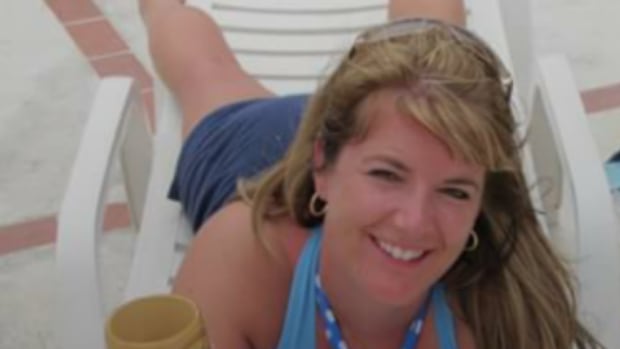ManitobaThe sister of a 33-year-old single mother murdered over a decade ago wants more strict conditions embedded in the Criminal Code after the man convicted in her death was granted brief escorted leaves from prison for spiritual reasons.Parole board grants man who murdered Gina Swanson in 2011 escorted absences as part of rehabilitationBryce Hoye · CBC News · Posted: Oct 01, 2025 6:30 AM EDT | Last Updated: 3 hours agoGina Swanson, a 33-year-old single mother, was killed in her Fort Garry home in May 2011. (Family photo)The sister of a 33-year-old single mother murdered over a decade ago wants changes to the Criminal Code after the man convicted in her death was granted brief escorted leaves from prison for spiritual reasons.Kirstin Swanson argues Schuyler Van Wissen shouldn’t be allowed escorted temporary absences from the detention facility where he is currently serving a life sentence for first-degree murder in the death of her sister, Gina Swanson.”I was shocked,” said Kirstin. “We thought justice was going to be at least 25 years of peace for my family and friends. And sure enough, I find out about this escorted temporary absence and it’s like it’s starting all over again.”Kirstin suggested the escorted leaves are unjust and underscore an element of Canadian law she wants revised — namely, making it so someone convicted of first-degree murder not be eligible for the leaves before they qualify to apply for parole after 25 years. Gina was found dead on the living room floor of her Fort Garry-area home on May 14, 2011. Prosecutors alleged at trial that Van Wissen stabbed, strangled and sexually assaulted Gina that morning. She was found by her father, bound with a bag over her head, after she failed to show up for work.Van Wissen pleaded not guilty. A jury found him guilty of first-degree murder at trial in 2016, and he was sentenced to life in prison with no chance of parole for 25 years.He was also put on the sex offender registry for 20 years and subject to a lifetime weapons ban.Van Wissen’s appeal was dismissed in 2018.This summer, Van Wissen was granted escorted leaves of absence from prison, according to Parole Board of Canada documents from Aug. 14 obtained by CBC News. Schuyler Van Wissen pleaded not guilty to first-degree murder in connection with Swanson’s death. He was convicted of first-degree murder at trial in 2016 and sentenced to life in prison with no chance of parole for 25 years. (Facebook)Escorted temporary absences are generally granted for administrative purposes, personal development, health and rehabilitative programming, attending funerals, participating in cultural or spiritual activities, and family or judicial reasons.The leaves entitle Van Wissen to three 3½-hour–long absences over the next year “for personal development for rehabilitative purposes,” the documents suggest.Kirstin said the news has been overwhelming for the family, including Gina’s daughter who is now 21.”The justice system … seems very, very broken,” Kirstin told Information Radio host Marcy Markusa.Kirstin wrote a letter to federal Justice Minister Sean Fraser criticizing the decision by a panel of the Parole Board of Canada.”If Canada’s strongest sentence cannot even guarantee victims’ families peace for 25 years, then our justice system is not delivering justice at all,” reads a portion of the letter.In its August 2025 decision, the parole panel acknowledged Van Wissen committed a “very brutal and sexual crime,” and that family strongly opposed “any form of conditional release.”WATCH | Sister of slain Winnipeg woman ‘shocked’ killer granted escorted leaves:Sister of slain Winnipeg woman shocked killer granted escorted prison leavesSchuyler Van Wissen was convicted of first-degree murder in the death of Gina Swanson in 2011. Recently, he was granted escorted temporary absences from prison to attend Muslim religious services. Kirstin Swanson, Gina’s sister, talks about the Parole Board of Canada decision.In the panel’s decision, it explains Van Wissen was assessed as having a lower likelihood of recidivism in general, moderate risk for violent re-offence, and an “average” risk for sexual recidivism.The documents suggest he was a “regular cocaine user” before the offence and an assessment suggest there was a link between his actions and substance use. He was found unresponsive in his cell in 2023 after doing a “large amount of cocaine” and indicated he wanted to end his life, according to the parole review.The document suggests Van Swissen distanced himself from the institutional drug subculture sometime after that. He credited improved behaviour in part to therapy.The parole documents state he completed various training and sex offender rehabilitation programs since 2021.”The board believes that although you have made gains, you still have some work to do in understanding the real motive behind your violent crime,” reads a portion of the parole document. “However, the board concludes that you have made sufficient observable and measurable change for the proposed [escorted temporary absence].”They granted him the three absences to attend Muslim religious services at a mosque for professional development and spiritual purposes. He will be shackled and accompanied by the institutional chaplain and two armed officers, according to the document.”Somebody that has committed [first-degree murder] so, so violently, I don’t understand how any parole board can see that there’s any type of rehabilitation that could be done,” Kirstin said.Kirstin Swanson, sister of Gina Swanson, argues the man convicted of first-degree murder in her 2011 death, Schuyler Van Wissen, should not be granted escorted temporary absences from prison over the next year. (CBC)The John Howard Society works with people involved in the criminal justice system, including those serving time and after being released from incarceration. Interim executive director for the society, Aiden Enns, sympathizes with families who have lost someone to “horrendous violence such as murder.””I can understand if a person feels that it’s not fair that they’re being released even temporarily with an escort before 25 years,” he said.Enns also says the correctional system is meant not just to protect society from harm, but to also rehabilitate and reintegrate the incarcerated.”Once they have achieved eligibility for an escorted temporary absence, they’ve accomplished a lot in their rehabilitation, so this is an indication of how well they’re progressing, in the eyes of the institution, along the path of rehabilitation and reintegration,” he said.”I want the best for them, to be high functioning individuals who … don’t pose a risk to others and moreover begin to find meaning in a good path in their lives,” said Enns.”I want to think of individuals that way, as opposed to just people who need punishment and just treating them as objects of violence.”ABOUT THE AUTHORBryce Hoye is a multi-platform journalist with a background in wildlife biology. He has worked for CBC Manitoba for over a decade with stints producing at CBC’s Quirks & Quarks and Front Burner. He was a 2024-25 Knight Science Journalism Fellow at MIT. He is also Prairie rep for outCBC. He has won a national Radio Television Digital News Association award for a 2017 feature on the history of the fur trade, and a 2023 Prairie region award for an audio documentary about a Chinese-Canadian father passing down his love for hockey to the next generation of Asian Canadians.Selected storiesEmail: bryce.hoye@cbc.caFacebookMore by Bryce HoyeWith files from Marshal Hodgins
Wednesday, 1 Oct 2025
Canada – The Illusion
Search
Have an existing account?
Sign In
© 2022 Foxiz News Network. Ruby Design Company. All Rights Reserved.












